Edible flowers, until now a niche specialized market, are booming in Spain. "We have a few companies in Spain. Each of them has its own specificity and, although we are natural competitors, we are not rivals: there is a real need for corporatism to represent our interests in such an innovative sector. We are creating an association of edible flower producers to advance the profession and the market. This will allow us to be better represented before official bodies, which do not usually listen to small producers", comments Laura Carrera, CEO of Innoflower, a member of the Frutas Olivar de Mercamadrid group founded in 2016.
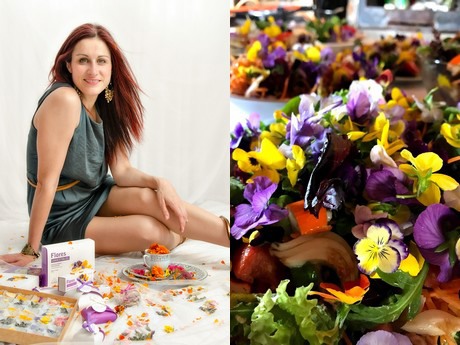
Laura Carrera, CEO of Innoflower
Laura Carrera is a doctor specialized in the reproductive biology of flowers and now an entrepreneur. "I thought it was important to combine different perspectives in a single profession: from the analysis of varieties in the laboratory, the practice of cropland and entrepreneurial activity," notes Laura Carrera.
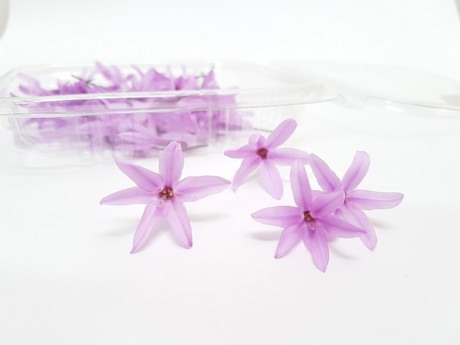
Fresh flower of I range (Tulbaghia)
"The world of edible flowers is much wider than a simple flower added to a salad. That would be the product of the I range: the fresh flower, selected in the field and in the workshop, with no more processing than its visual selection. The date of preferential consumption goes from 3 to 12 days (depending on species), under controlled temperature between 4 and 6 ºC and without breaking the cold chain. Hence the difficulty of combining flowers with other plants, such as salads in bags (pre-prepared convenience food products), with other conservation requirements", continues Laura..
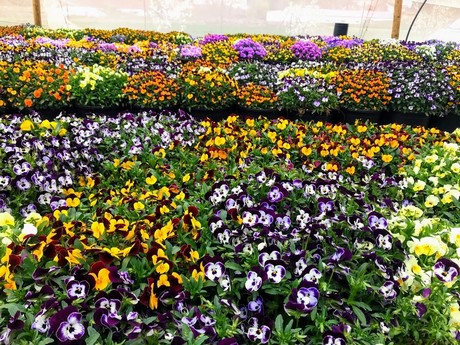
Borobia mini-pancies
The processed flowers for the gastronomy sector are presented in different formats:
- The dehydrated flower from which the moisture has been extracted and which has a shelf life of more than 2 years. Its uses, from infusions to use in cocktails.
- The freeze-dried edible flower. It is a highly technological process, where the flower maintains all its properties and eye-catching. After a freezing or ultrafreezing process the humidity is eliminated by high pressures (sublimation), obtaining a product with a useful life of more than 2 years. The main use is in bakery.
- The crystallized flower. It is pure beauty, nature preserved and edible, keeping its natural form almost intact. It is glazed with egg, pasteurized by hand, petal by petal with a brush, coated with sugar and then dehydrated at low temperature for 4 days. This laborious process is authentic craftsmanship.
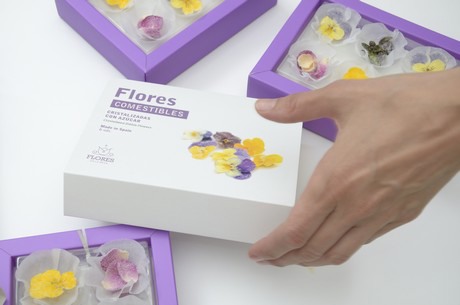 - The flour of edible flowers, either dried or freeze-dried, used for the food industry. Increasingly successful in different sectors are the powdered flowers to make from dough to ice cream, to more original uses such as the use of an ingredient to make croquettes, flower breads, etc..
- The flour of edible flowers, either dried or freeze-dried, used for the food industry. Increasingly successful in different sectors are the powdered flowers to make from dough to ice cream, to more original uses such as the use of an ingredient to make croquettes, flower breads, etc..
"Our continental Mediterranean climate is ideal for certain types of flowers such as mini-pencies. Any production area has its advantages and disadvantages, there is no perfect climate, it is simply a matter of knowing how to choose the varieties that best suit the context, the optimal planting date and thus respond to market demand," concludes Laura.
With farms in Soria and Zaragoza, Laura Carrera comments that the handling of edible flowers is not so different from that of other horticultural products. Because of this, it is also related to times of the year and their handling. And that this consumption is sometimes erratic and subject to national festivities.
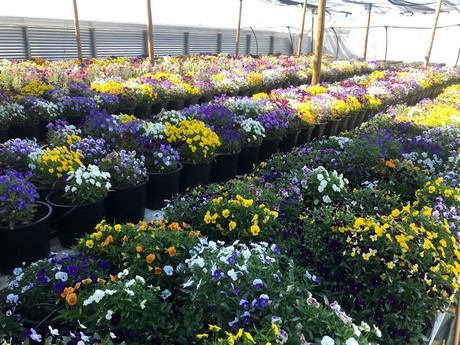 Innoflower sells more than 50 varieties. Farms in different climates allow flowers to be offered throughout the 12 months of the year. "For now our volume is more than enough to supply the Spanish market and the one from France and Italy. But we are continuing to expand: this is only our third year", explains Laura Carrera.
Innoflower sells more than 50 varieties. Farms in different climates allow flowers to be offered throughout the 12 months of the year. "For now our volume is more than enough to supply the Spanish market and the one from France and Italy. But we are continuing to expand: this is only our third year", explains Laura Carrera.
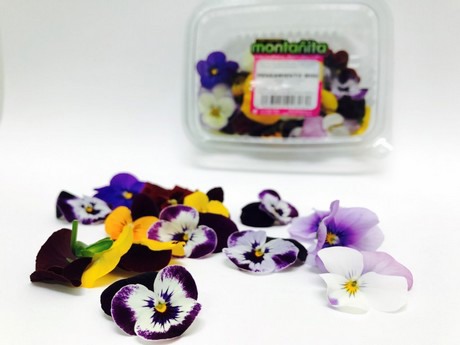
Mini-pancies
Founded in 2016, the company is dedicated to the cultivation, collection, marketing and direct sale of edible flowers. Makro's supplier, Montañita sells the high-quality pre-prepared convenience food brand distributed exclusively by Frutas Olivar de Mercamadrid and majority partner of Innoflower. The flowers are distributed to numerous stores through wholesalers such as Mercabarna and Mercamadrid, among other national markets.
For more information:
Laura Carrera, CEO
Innoflower
C/ Alejandro Bell 7-9
50014 Zaragoza
T: +34697162268
info@innoflower.com
www.innoflower.com
